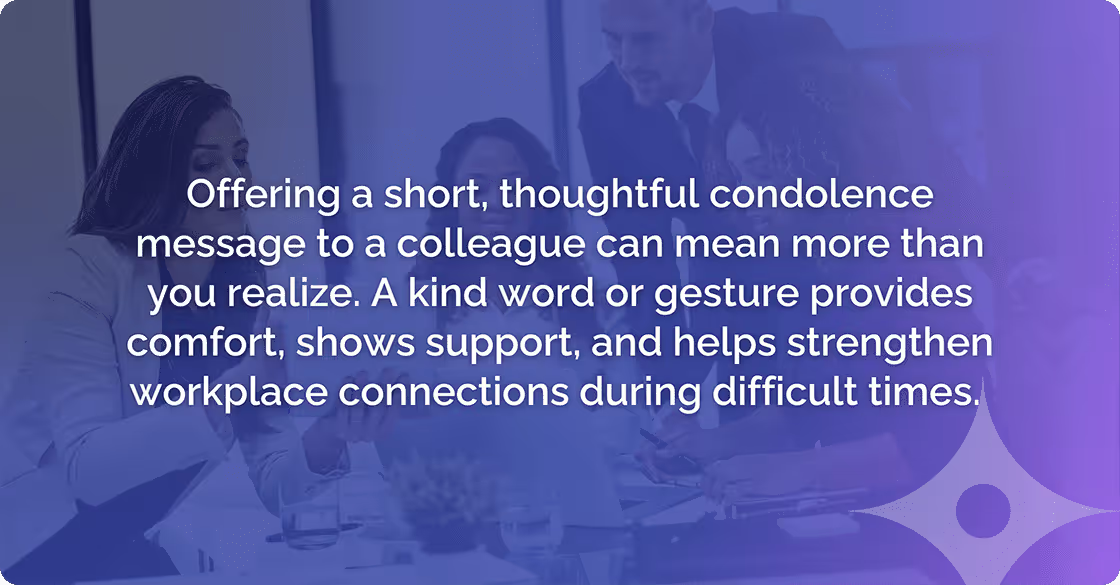How to Write a Short Condolence Message for a Coworker + 30 Examples
Discover how to write a thoughtful condolence message for a coworker with 30 examples and best practices for professional sympathy.

.avif)
Personalization in IC White Paper
Start communicating smarter. Download your free guide to personalization in internal communication now!
Access Now →Key Tips for Writing Condolence Messages to Coworkers
- Keep them sincere: Focus on expressing genuine sympathy without overdoing it. A simple, heartfelt message can offer comfort.
- Be mindful of tone: Adjust your tone based on your relationship. A more formal tone is often appropriate in workplace settings, but feel free to open up and be warmer with close colleagues.
- Respect privacy: Choose a private message over a public one unless the loss is widely known within the organization. If the person is a close friend, it’s a good idea to keep your message private - though you can also write a more public message as well.
- Offer support: Including a brief offer of support (e.g. "Let me know if you need anything") shows you're there for them without overstepping the mark.
- Keep it short: A few well-chosen words are often more meaningful than a long message, especially when emotions are high.
- When a coworker experiences a loss, whether it's the death of a loved one, a child, a pet, or a sudden tragedy, offering a short, thoughtful condolence message to a colleague can mean more than you realize. A kind word or gesture provides comfort, shows support, and helps strengthen workplace connections during difficult times. The key is to emphasize that empathy and genuine support are critical to fostering a compassionate and resilient work environment.

Grief and loss expert David Kessler, founder of grief.com believes that grief shouldn’t be avoided in the workplace. Being there for a grieving coworker is not only an opportunity to support them in taking time off but also to remind them how valued they are by their colleagues.
“We actually want to say, ‘We're glad you took time and we missed you and you're valuable.’ People want to feel valued and missed.”
David Kessler
In this post, we are going to share a few simple steps to help you write a short condolence message for a coworker, along with more than 30 examples you can adapt to different situations. We will also highlight best practices based on recent findings on empathy and communication in the workplace, including respecting cultural differences and choosing the right communication channel. Whether you’re writing a card, sending a message, or preparing a thoughtful email, these examples and tips will help you offer comfort with care and professionalism.
Is it Appropriate to Send a Condolence Message to a Coworker?
Yes, it is appropriate to send a condolence message for a coworker who is grieving, and it is usually deeply appreciated.
Many people wonder if reaching out might be seen as intrusive or crossing a boundary. However, offering a simple, sincere message acknowledges the person’s loss and shows that you recognize their humanity beyond the workplace. Thoughtful communication, even in brief form, can make a lasting positive impact, helping coworkers feel seen, supported, and less isolated during a difficult time.
Recent workplace studies emphasize the growing expectation for empathy at work. For example, the 2024 Businessolver State of Workplace Empathy Study highlights the significant role empathy plays in the workplace. It notes that 77% of employees would work longer hours for an empathetic employer, and 60% would take a pay cut to work for one who was empathetic.

This study also reveals that while 85% of employees consider "demonstrating that an employee’s family is equally as important as their job" as a key empathetic behavior, only 35% have experienced this from colleagues and supervisors. This gap underscores the need for genuine empathetic actions in the workplace.
Of course, it’s important to tailor your approach based on your relationship with the coworker and the culture of your workplace. If you’re unsure, a brief, respectful message or card is a safe and considerate choice. It’s not about finding the perfect words-it’s about offering genuine kindness at a time when it matters most.
A slightly earlier Ernst & Young 2023 Empathy in Business Survey found that 86% of employees believe empathetic leadership boosts morale, and 87% say empathy is essential to fostering an inclusive environment. Additionally, mutual empathy between company leaders and employees leads to increased efficiency (88%), creativity (87%), job satisfaction (87%), idea sharing (86%), innovation (85%), and even company revenue (83%).
Personalization Strategies to Enhance Engagement — Free White Paper
Boost employee engagement by implementing personalization in internal comms

Download Free
How to Write a Thoughtful Condolence Message to a Colleague
When a coworker experiences a loss, sending a thoughtful condolence message can offer real comfort during an incredibly difficult time. However, it’s natural to feel unsure about what to say. You want to be supportive without being intrusive or saying the wrong thing. A well-crafted message doesn’t need to be long or elaborate. What matters most is sincerity, compassion, and respect.
Here are a few simple steps you can follow, each with tips and examples to help you write a condolence message for a coworker that feels both meaningful and appropriate.
Start with a Simple Expression of Sympathy
Open your message by clearly expressing your sincere condolences. You don’t need to use elaborate language - a simple and heartfelt statement is best.
- "I’m so sorry for your loss."
- "Please accept my deepest condolences during this difficult time."
- "Thinking of you and your family."
Acknowledge the Loss
Recognizing the specific relationship or type of loss (if you know it) shows your coworker that you are aware of and honoring what they are going through. It personalizes your message without feeling invasive.
- "I know how close you were to your mother. My heart goes out to you."
- "Losing a pet is losing a member of the family - I’m thinking of you."
- "I was so sorry to hear about your brother’s passing."
Offer Support
Briefly offer your support in a way that feels natural. You don’t need to overpromise. Simply letting your colleague know you’re there can provide powerful support.
- "If there’s anything I can do to lighten your load at work, please let me know."
- "I’m here if you need anything or just want someone to talk to."
- "Don’t hesitate to reach out if you need support during this time."
Keep it Brief and Respectful
Grief can be overwhelming, and long messages may feel burdensome. Keep your message short but meaningful, focusing on empathy rather than advice. Aim for no more than two to five sentences.
- "I'm so sorry to hear about your loss. Please know that I’m thinking of you and sending strength your way. If you need anything, I'm here."
Choose the Right Tone and Medium
Think about your relationship with the coworker and your company culture. A card, handwritten note, personal email, or even a thoughtful chat message can be appropriate depending on the situation.
- Formal: "Sending my sincere condolences to you and your family during this time."
- Casual (close colleague): "I’m so sorry you’re going through this. Let me know if you need to vent or just take a break."
In more formal environments, avoid emojis and slang. In closer relationships, a more personal and warm tone is fine.
Be Mindful of Cultural and Personal Differences
Different cultures and individuals handle grief differently. Be respectful and avoid making assumptions about religious or spiritual beliefs unless you are certain they would appreciate it.
- Neutral: "Thinking of you during this difficult time."
- If religious: "Keeping you and your family in my thoughts and prayers." (Only say this if it is appropriate.)
- Avoid assumptions like: "They’re in a better place now," unless you are 100% sure it aligns with the person's beliefs.

30 Examples of Personalized Condolence Messages for Coworkers
Expressing sincere condolences can be a delicate task, but the right words can offer comfort and support during times of grief. Whether you’re a manager, a teammate, or simply someone who cares, a personalized message can show empathy and help strengthen workplace bonds.
Here are 30 examples of condolence messages for various situations, including the loss of family members and pets to help guide you through this sensitive process.
Personalization Strategies to Enhance Engagement — Free White Paper
Boost employee engagement by implementing personalization in internal comms

Download Free
Condolence Messages from a Manager
As a manager, offering condolences to a grieving employee is essential to show care and leadership. A thoughtful message can provide emotional support while fostering trust and respect in the workplace.
- "On behalf of [Company Name], please accept our deepest sympathies. We’re here to support you in any way you need during this time."
- "Your strength during this difficult period is admirable. Please know that we’ll handle your workload so you can focus on healing."
- "We’ve arranged meal deliveries for your family this week. Let me know if there’s anything else we can do to ease this burden."
- "Your dedication to your work is respected, but your well-being comes first. Take all the time you need-we’re here for you."
- "I’ve temporarily reassigned your client meetings. Please focus on what matters most right now."
Condolence Messages from a Team
When a team member experiences a loss, a collective message can demonstrate unity and solidarity. A group message from coworkers shows that the entire team is there to offer support during a difficult time.
- "Our team donated to [Charity Name] in your loved one’s memory. We’re holding you close in our thoughts."
- "We’ve created a shared journal of memories about your [family member]. It’s waiting whenever you’re ready."
- "Your work family is covering all urgent tasks. We’ll keep the coffee warm for when you return."
- "We’ve planted a memorial tree in the office garden to honor your loss. It grows with our support."
- "The entire marketing team sends love. We’re just an email away for anything-even midnight chats."
Condolence Messages for the Loss of a Spouse
Losing a spouse is a deeply personal and painful experience. A condolence message for this loss should be heartfelt, expressing sympathy while acknowledging the profound impact on the employee’s life.
- "We’re heartbroken to hear about [Name]’s passing. Their kindness lit up every room they entered."
- "I’ve scheduled a grocery delivery for Tuesday. No need to reply - I just want to help however I can."
- "Your love story inspired us all. [Name]’s legacy lives through the joy they brought others."
- "The accounting team contributed to a grief counseling fund. Please, use it however helps most."
- "I remember how [Name] always asked about our projects. They’ll be deeply missed."
Condolence Messages for the Loss of a Parent
Losing a spouse is a deeply personal and painful experience. In this case, a condolence message for a coworker should be heartfelt, expressing sympathy while acknowledging the profound impact on the employee’s life.
- "Your [mother’s] famous cookie recipe is now part of our team cookbook. Her spirit nourishes us all."
- "We’ve shared your favorite stories about your [father] at today’s meeting. His wisdom touched us all."
- "The IT department created a digital memory book. Add photos whenever you feel ready."
- "Your [parent]’s obituary mentioned their volunteer work. We’ve made a donation in their honor."
- "I’ll be handling your client calls indefinitely. Your only job now is to care for yourself."
Condolence Messages for the Loss of a Child
The loss of a child is one of the most devastating experiences a person can go through. A condolence message for a coworker should offer profound empathy, acknowledging the depth of grief and offering support during such a tragic time.
- "No words can ease this pain, but we’ve lit a candle at the office shrine every morning."
- "The design team made memorial bookmarks with [Child’s Name]’s artwork. They’re in your desk drawer."
- "We’ve arranged a bereavement leave extension. HR has all the paperwork handled."
- "Your child’s favorite charity received donations from the sales team. Their light continues shining."
- "I’ve muted all work chat notifications. Reach out only when you’re ready - we’ll be here."
Condolence Messages for the Loss of a Pet
Losing a pet can be as heart-wrenching as losing a family member. A condolence message for this loss should express understanding and sympathy for the unique bond shared between the employee and their pet.
- "[Pet’s Name]’s photo now graces our office pet wall. Their memory brings smiles daily."
- "The reception team donated to the animal shelter where you adopted. [Pet’s Name]’s legacy lives on."
- "We’ve framed your favorite photo of [Pet’s Name] for your desk. Take all the time you need."
- "The break room now has a memorial jar for pet stories. Yours was the first entry."
- "I’ve rescheduled your meetings next week. Spend time with [Pet’s Name]’s favorite toys."
Why Is It Important to Send a Condolence Message to a Colleague
Sending a condolence message to a grieving coworker is more than a polite gesture. It's a meaningful act that fosters a compassionate and supportive workplace culture. According to the leading job search engine Indeed, offering sympathy through a condolence message can help a colleague maintain their self-worth and reminds them that they are valued during a challenging time.
Additionally, The Muse highlights that a heartfelt message demonstrates genuine concern for a coworker's well-being and contributes to a workplace culture of compassion and support.
In essence, expressing condolences not only provides comfort to the individual but also strengthens team bonds and promotes a culture of empathy within the organization.

Do You Send A Private Condolence Message vs a Public Email
When deciding whether to send a private email condolence message or a public email, it's important to consider the individual's preferences, the workplace culture, and the nature of the loss. In most cases, a private message is the safest and most respectful option. It allows you to express your sympathy without putting the colleague in a potentially uncomfortable public situation. A personal note, whether by email or card, shows thoughtfulness and gives the grieving employee space to process their emotions without drawing attention.
However, in some instances, particularly when the loss affects the wider team or organization (such as the passing of a prominent leader), a public email may be appropriate. This should be carefully worded to acknowledge the loss while respecting the individual’s privacy. The key is to strike a balance between offering condolences and maintaining the individual's dignity during a difficult time. Always be mindful of cultural differences and personal boundaries when deciding how to approach the situation.
Send Personalized Messages with Cerkl Broadcast
When it comes to expressing condolences in the workplace, personalization is key to ensuring your message resonates with the recipient. Cerkl Broadcast provides an easy-to-use platform for delivering personalized, thoughtful messages to employees, colleagues, or teams during sensitive times like a loss. With Cerkl Broadcast, you can craft messages tailored to the individual’s situation, delivering comfort and support in a way that feels genuine and heartfelt.
By using Cerkl Broadcast, you can segment your communication based on specific groups, ensuring that each employee receives a message that speaks to their experience. Whether you’re sending out a company-wide update, a targeted message to an individual, or a group message, the Cerkl platform helps streamline this process, ensuring each message is timely, relevant, and respectful. Personalizing these communications through Broadcast not only demonstrates empathy but also strengthens the culture of care and support within your organization.
What’s Next
We understand how difficult it can be dealing with grief in the workplace. However, personalization is undoubtedly key to addressing caring and concern. This is why we are sharing Cerkl’s free guide to personalization in internal communication. Please feel free to use it to personalize messages during any grieving period.

Personalization Strategies to Enhance Engagement — Free White Paper
Boost employee engagement by implementing personalization in internal comms
Download Free
FAQ
How do you express condolences to a coworker?
Express condolences to a coworker by offering a brief, heartfelt message that acknowledges their loss. Keep your tone respectful and compassionate, ensuring they feel supported without being overwhelmed.
What is the best short condolence sentence for a colleague?
simple, heartfelt sentence like "I am so sorry for your loss, and I’m thinking of you during this difficult time" is appropriate. It’s brief, sincere, and shows empathy without overstepping personal boundaries.
How do you express condolences professionally?
When expressing condolences professionally, keep the message respectful, concise, and appropriate for the workplace. Acknowledge the loss and offer support while maintaining a tone of professionalism and empathy.








.avif)
